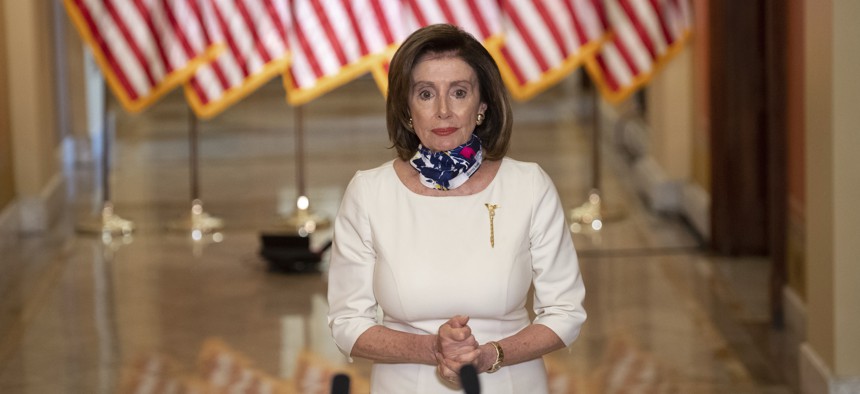House Democrats Offer Coronavirus Package with $1 Trillion for State and Local Governments

House Speaker Nancy Pelosi of Calif., walks to speak about the so-called Heroes Act, Tuesday, May 12, 2020 on Capitol Hill in Washington. Pelosi unveiled a more than $3 trillion coronavirus aid package. Saul Loeb/Pool via AP
The $3 trillion proposal would also allow states and localities to use prior funding to offset tax revenue lost due to the pandemic.
House Democrats on Tuesday released a $3 trillion proposal to provide more coronavirus relief, which would direct more than $900 billion for state and local governments and loosen restrictions on prior aid to allow them to use funds to cover reduced tax revenues due to the pandemic.
The 1,800-page bill, dubbed the HEROES Act, is just a starting block for Democrats, but lays out their priorities in the next round of coronavirus aid. Senate Republican leaders, who are preparing their own package to provide liability protections for healthcare workers and businesses, have indicated they intend to pause before moving forward with more financial assistance.
Several provisions in the bill, which the House of Representatives expects to take up by Friday, would expand funding for programs created in previous coronavirus packages. For instance, it would send another round of direct payments to Americans, providing $1,200 per person and up to $6,000 per household. The bill would also extend the weekly $600 payments of extra federal unemployment benefits through January. The payments are currently set to stop in July.
With more than 33 million Americans filing for unemployment over the last two months, House Speaker Nancy Pelosi said Congress needs to think big with its response.
“Not acting is the most expensive course,” she said.
The bill would provide unprecedented aid to city and county governments, as only the largest cities received direct funding in a prior package. Specifically, states would receive $500 billion and local governments would receive $375 billion.
Municipalities would receive $187 billion, with the money allocated using a modified Community Development Block Grant formula. Counties would receive the same amount but the money would be distributed based on population. Territories and tribes would each receive $20 billion.
The bill supports state and local governments in another big way—allowing them to use federal coronavirus funding from this bill and past legislation to offset “lost, delayed, or decreased revenue stemming from the COVID public health emergency.”
The inability of state and local governments to use federal funding to offset revenue declines and losses has been a major sticking point for state and local government leaders.
Governors, along with county and municipal government associations, have pushed federal lawmakers to include more money for their governments in coronavirus aid packages, saying they are being forced to spend huge sums on the public health response while in the midst of an ongoing economic crisis. They’ve argued that finding replacement revenue is necessary because states generally are required to balance their budgets, while cuts to services or tax increases during the recession brought on by the coronavirus will hurt their recoveries.
Providing additional funding for state and local governments, which are expected to face severe budget shortfalls due to a decline in revenues, has become a partisan battle line on Capitol Hill.
Some Republicans have said they are concerned the money will be used to “bail out” irresponsible states that already had too large governments.
Other measures included in the House legislation are $200 billion to provide hazard pay to frontline workers, a $10 billion expansion of the food stamps program, $175 billion in housing assistance for renters and homeowners, and $75 billion for public health measures like testing and contact tracing.
It also includes a provision to roll back the $10,000 cap on a federal deduction for state and local taxes, known as the SALT deduction, that was included in the 2017 Republican tax cut. Restoring the deduction, which largely benefits higher income people, has been a priority of Democratic leaders of states with high taxes, as they see it as vital to supporting people who pay high local taxes for services like public education.
Though the House intends to vote on the proposal by the week’s end, Republicans are unlikely to act quickly. Republican Senate Majority Leader Mitch McConnell has said it is necessary to assess how effective previous aid packages have been for workers and the economy before allocating more money.
"We now have a debt the size of our economy," he said. "So, I've said, and the president has said as well, that we have to take a pause here and take a look at what we've done."
Meanwhile, McConnell has called litigation liability protections a “red line” that must be included in any future aid package.
“To be clear: We are not talking about immunity from lawsuits. There will be accountability for actual gross negligence and intentional misconduct,” McConnell said Tuesday. “If we want American workers to clock back in, we need employers to know that if they follow the guidelines, they will not be left to drown in opportunistic litigation.”
Andrea Noble is a staff correspondent for Route Fifty.
NEXT STORY: Western States Pact Asks for $1 Trillion in Coronavirus Relief





